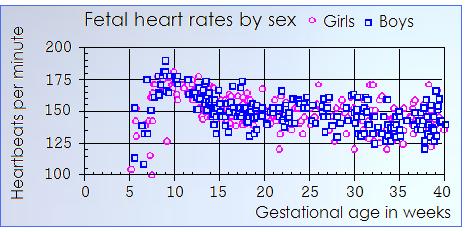From the date of the last menstrual period, the fetal heart will begin to beat on the 22nd day of development. This means that by the 5th week of pregnancy, the heart is beating. Until week 9, the fetal heart rate will increase 3.3 beats per day. In the early stages, the fetal heart rate is approximately 80-85 beats per minute (bpm). However, by the 9th week your baby's heart beat will be in the range of 155 to 195 beats per minute. Most expectant parents say that the fetal heart rate sounds like the galloping of a horse.
Hearing your baby's heartbeat for the first time is a magical moment for most expectant parents. Although the heart begins beating around the 5th week of a 40 week pregnancy, you will not be able to actually hear the heartbeat quite so early. Approximately 9 or 10 weeks after your last menstrual period, it is possible to hear the heartbeat with a special instrument called a doppler. The doppler simply bounces sound waves off of your baby's heart to produce sounds. This does not hurt you or your baby. Hearing the heartbeat this early will depend upon several factors. If you are overweight, it might be harder to hear the heartbeat.
Even though you can not hear the fetal heartbeat until week 9 or 10, ultrasound is able to see a beating heart much sooner. An ultrasound can pick up the heartbeat as a "flicker" in the chest as early as four weeks after conception. Your caregiver will listen to your baby's heart at each prenatal visit. Checking the fetal heart rate is one of the easiest ways to monitor your baby's health and condition. Your healthcare provider will check your baby's heartbeat on one of two ways. The first method is to count the number of beats for one full minute. The second method is to count the beats for 15 seconds and multiply by four. Most doctors will tell you your baby's heart rate when they are finished listening, but don't be alarmed if they forget to.
Many expectant mothers wish to monitor their baby's heartbeat at home in between prenatal visits. There are many brands of doppler-like instruments on the market and a good one can cost around $500. There are cheaper versions that are sold in department stores and most women do not have any luck with them. As nice as it would be to monitor your baby at home, you might worry needlessly about your baby if you have trouble hearing the heartbeat. After 20 weeks of pregnancy, it is possible to hear your baby's heartbeat with a stethoscope.
There is an old wives tale that supposedly predicts the baby's gender based on how fast or slow the heart is beating. Supposedly, if the fetal heart rate is above 140 you are expecting a girl. However, if the heart rate is below 140, it is supposed to be a boy. There is no evidence or statistical proof to support this theory.
Some facts
- Stress-related changes in a pregnant woman's heart rate and blood pressure, along with chronic anxiety, can affect the heart rate of her developing fetus. link
- Chinese researchers found that the fetuses responded to their own mother's voice with heart-rate acceleration and to the stranger's voice with a heart-rate deceleration. This also shows that your baby can already learn, remember and recognise before it's born. link
- Does the fetal heart rate predict the *** of the baby? - A research by the University of Arkansas among 2500 pregnant women showed that this (old wives tale) is not true.
ا


طمنينا